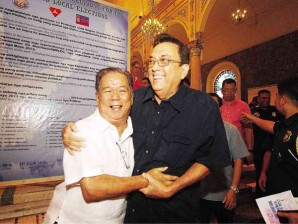2013 polls to test clout of titans over Negros politics

NEGROS Gov. Alfredo Marañon Jr. and his rival in the gubernatorial race, Vice Gov. Genaro Alvarez Jr., hug for the cameras at the signing of the peace covenant at the start of the campaign at San Sebastian Cathedral in Bacolod City, Negros Occidental. CARLA P. GOMEZ
NEGROS OCCIDENTAL—Results of the gubernatorial race in Negros Occidental will be a gauge of how much clout the so-called titans and kingmakers of the province still have on the province’s politics.
Vice Gov. Genaro Montilla Alvarez Jr. enjoys the backing of business tycoon, Eduardo Cojuangco, founder of the Nationalist People’s Coalition (NPC), and Negros Occidental Rep. Alfredo Benitez of the province’s third district, the province’s Liberal Party chair and fourth-richest man in the House of Representatives in 2012.
Gov. Alfredo Marañon Jr., however, has the support of sectoral groups in the province, among them sugar and business groups, fishermen and farmers’ organizations.
Alvarez, a relative of Cojuangco’s wife, Gretchen Montilla Oppen, admits that having the support of the tycoon and Benitez is an advantage.
“Notwithstanding the machinery that boosts my chances of winning the elections, I consider their support an acknowledgment of my leadership, accomplishments in public service and agenda that would truly be good for the province,” Alvarez said.
Article continues after this advertisementMarañon refused to answer if the support of Cojuangco and Benitez for his rival is a threat to his reelection bid.
Article continues after this advertisement“Leaders are chosen by the people. Let’s allow them, therefore, to choose freely on Monday whom they would like to lead the province in the next three years not through the use of guns, goons and gold,” he said.
Alvarez has denied his camp has guns, goons and gold.
Both Marañon and Alvarez are claiming they are qualified to sit at the helm of the provincial government.
Marañon has 50 years of public service to his name. He was a councilor, then mayor of Sagay City and second district congressman before becoming governor in 2010.
He said his decision to seek reelection was anchored on the clamor of the poor and mayors who benefited from his irrigation programs and rice self-sufficiency campaign.
If reelected, Marañon promises to pursue the second phase of the 11-point Negros First Agenda, his roadmap for the province’s progress, and improve the delivery of basic social services, especially on health.
Marañon said that due to sound fiscal management, the provincial government had won several awards like the Seal of Good Housekeeping from the Department of the Interior and Local Government in 2011 and 2012.
Alvarez said his 24-year experience in public service qualified him for governor. Before he was elected vice governor, he was board member and sixth district congressman.
“I know I can do more for the province of Negros Occidental. Majority of my party mates in the NPC have pushed me to run for governor. And I want to deliver true service to the people that will help alleviate their living condition,” he said.
He has vowed to manage the province’s coffers efficiently, claiming the provincial government is burdened with loans.
“I will push for progress and provide opportunities for development without incurring huge loans but through public-private partnership,” he said.
He promised to implement propoor programs on health and education and to allocate funds for the scholarship of 500 students per local government unit.
Marañon and Alvarez, both of the NPC, used to be part of the United Negros Alliance (UNA), a formidable coalition that was founded by Cojuangco and had monopolized the province’s politics for more than 10 years.
The coalition broke up when Alvarez challenged the reelection bid of UNA chair, Marañon.
The split was felt in the 31 cities and towns with both camps fielding full slates.
Cojuangco has explained that he gave his commitment to Alvarez after Marañon decided not to run again for governor.
When the governor changed his mind, Cojuangco said he could no longer backtrack on his commitment to Alvarez.
Local officials started to take sides after the line had been drawn.
According to the Alvarez camp, he has the support of 17 mayors, leaving Marañon with 14 mayors.
The six congressmen of Negros Occidental are equally split between the two camps.
Alvarez has Benitez, his daughter Rep. Mercedes Alvarez (sixth district) and Rep. Julio Ledesma IV (first district).
On Marañon’s side are his son, Rep. Alfredo Marañon III (second district), Rep. Jeffrey Ferrer (fourth district) and Rep. Alejandro Mirasol (fifth district).
The fourth district is another battleground between the two titans, “the wealth of Cojuangco against that of the late sugar czar Roberto Benedicto.”
Ferrer is married to the granddaughter of Benedicto, La Carlota City Mayor Juliet Marie Ferrer.
He is a member of the NPC until he threw his support behind Marañon. As a result, Ferrer was dropped as official candidate of the NPC.
The Alvarez-Cojuangco camp fielded lawyer Ike Barredo to challenge Ferrer’s reelection bid in the fourth congressional district.
The results of elections in the fourth district will be a gauge of Cojuangco’s political clout in the district that has been seen as his stronghold, political observers said.
The tycoon’s son, Charlie, was congressman of the fourth district. When his third term ended in 2007, the Cojuangcos threw their support behind Ferrer.
The results of Monday’s elections will be a testament to the kind of influence the economic titans have over Negros Occidental.